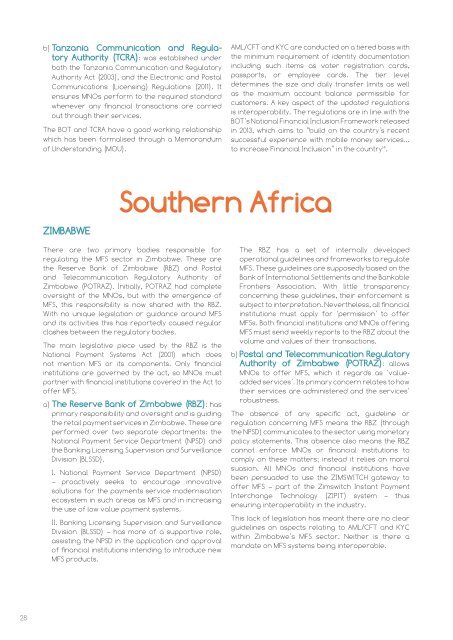FiA_2015
You also want an ePaper? Increase the reach of your titles
YUMPU automatically turns print PDFs into web optimized ePapers that Google loves.
) Tanzania Communication and Regulatory<br />
Authority (TCRA): was established under<br />
both the Tanzania Communication and Regulatory<br />
Authority Act (2003), and the Electronic and Postal<br />
Communications (Licensing) Regulations (2011). It<br />
ensures MNOs perform to the required standard<br />
whenever any financial transactions are carried<br />
out through their services.<br />
The BOT and TCRA have a good working relationship<br />
which has been formalised through a Memorandum<br />
of Understanding (MOU).<br />
AML/CFT and KYC are conducted on a tiered basis with<br />
the minimum requirement of identity documentation<br />
including such items as voter registration cards,<br />
passports, or employee cards. The tier level<br />
determines the size and daily transfer limits as well<br />
as the maximum account balance permissible for<br />
customers. A key aspect of the updated regulations<br />
is interoperability. The regulations are in line with the<br />
BOT’s National Financial Inclusion Framework released<br />
in 2013, which aims to “build on the country’s recent<br />
successful experience with mobile money services...<br />
to increase Financial Inclusion” in the country 14 .<br />
Southern Africa<br />
ZIMBABWE<br />
There are two primary bodies responsible for<br />
regulating the MFS sector in Zimbabwe. These are<br />
the Reserve Bank of Zimbabwe (RBZ) and Postal<br />
and Telecommunication Regulatory Authority of<br />
Zimbabwe (POTRAZ). Initially, POTRAZ had complete<br />
oversight of the MNOs, but with the emergence of<br />
MFS, this responsibility is now shared with the RBZ.<br />
With no unique legislation or guidance around MFS<br />
and its activities this has reportedly caused regular<br />
clashes between the regulatory bodies.<br />
The main legislative piece used by the RBZ is the<br />
National Payment Systems Act (2001) which does<br />
not mention MFS or its components. Only financial<br />
institutions are governed by the act, so MNOs must<br />
partner with financial institutions covered in the Act to<br />
offer MFS.<br />
a) The Reserve Bank of Zimbabwe (RBZ): has<br />
primary responsibility and oversight and is guiding<br />
the retail payment services in Zimbabwe. These are<br />
performed over two separate departments: the<br />
National Payment Service Department (NPSD) and<br />
the Banking Licensing Supervision and Surveillance<br />
Division (BLSSD).<br />
I. National Payment Service Department (NPSD)<br />
– proactively seeks to encourage innovative<br />
solutions for the payments service modernisation<br />
ecosystem in such areas as MFS and in increasing<br />
the use of low value payment systems.<br />
II. Banking Licensing Supervision and Surveillance<br />
Division (BLSSD) – has more of a supportive role,<br />
assisting the NPSD in the application and approval<br />
of financial institutions intending to introduce new<br />
MFS products.<br />
The RBZ has a set of internally developed<br />
operational guidelines and frameworks to regulate<br />
MFS. These guidelines are supposedly based on the<br />
Bank of International Settlements and the Bankable<br />
Frontiers Association. With little transparency<br />
concerning these guidelines, their enforcement is<br />
subject to interpretation. Nevertheless, all financial<br />
institutions must apply for ‘permission’ to offer<br />
MFSs. Both financial institutions and MNOs offering<br />
MFS must send weekly reports to the RBZ about the<br />
volume and values of their transactions.<br />
b) Postal and Telecommunication Regulatory<br />
Authority of Zimbabwe (POTRAZ): allows<br />
MNOs to offer MFS, which it regards as ‘valueadded<br />
services’. Its primary concern relates to how<br />
their services are administered and the services’<br />
robustness.<br />
The absence of any specific act, guideline or<br />
regulation concerning MFS means the RBZ (through<br />
the NPSD) communicates to the sector using monetary<br />
policy statements. This absence also means the RBZ<br />
cannot enforce MNOs or financial institutions to<br />
comply on these matters; instead it relies on moral<br />
suasion. All MNOs and financial institutions have<br />
been persuaded to use the ZIMSWITCH gateway to<br />
offer MFS – part of the Zimswitch Instant Payment<br />
Interchange Technology (ZIPIT) system – thus<br />
ensuring interoperability in the industry.<br />
This lack of legislation has meant there are no clear<br />
guidelines on aspects relating to AML/CFT and KYC<br />
within Zimbabwe’s MFS sector. Neither is there a<br />
mandate on MFS systems being interoperable.<br />
28





